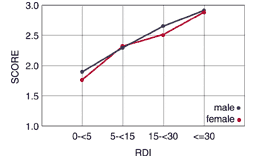12/14/06
According to a [removed]Reuters Health Report[/removed], French investigators found that people with sleep apnea had longer reaction times while driving, took longer to stop, and were more likely to crash into obstacles. S. Mazza, PhD, and colleagues at Grenoble University Hospital found that once people underwent treatment for their sleep-disordered breathing, driving skills improved significantly.
In collecting the data, Mazza and colleagues had 20 OSA patients and 20 people without OSA drive onto a platform where they had to brake to avoid a jet of water. Participants with sleep apnea took a half-second longer (on average) than the patients without apnea. On the road, this translates to an additional 20 yards of additional road needed for stopping. People with sleep apnea also collided with the water jet obstacle twice as often as those without the condition.
After 3 months of CPAP treatment, 10 of the sleep apnea patients were retested, and their stopping distances and reaction times were no different from those of the healthy controls. “Public health policy should take into account the impact of obstructive sleep apnea syndrome on driving ability in order to reduce traffic accidents,” concluded Mazza and fellow researchers.



